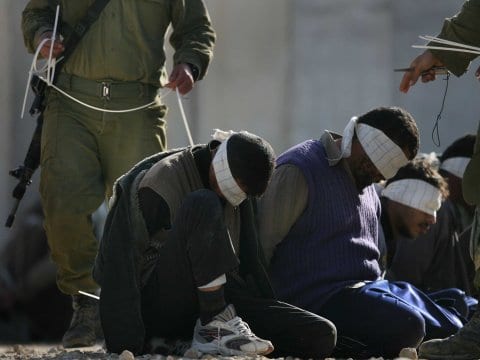By Meghna Sridhar and Tripp Zanetis, Jacobin
On April 17, on the anniversary of Palestinian Prisoners’ Day, over 1,500 Palestinians held in Israeli prisons launched a mass hunger strike. A month later, 834 of the prisoners remain on empty stomachs — with several dozens now placed on “close medical watch” by Israeli authorities. The strike has drawn a wave of solidarity among Palestinians and has been met with severe repression by Israeli authorities.
Weeks before the strike erupted, we visited the military courts in the West Bank as a part of a delegation from Stanford Law’s International Human Rights Clinic. Observing the court proceedings drove home how the prison system serves as a core pillar of the occupation — and why the prison strike has attracted so much support among Palestinians.
The prisoners are demanding better conditions: improved access to family visits and phone calls; access to books, newspapers, mail, and educational opportunities; and an end to administrative detention and solitary confinement.
Yet at the heart of their struggle lies a more insidious problem: the sprawling military court system that has stripped them of their dignity and incarcerated over one in three Palestinian men since 1967. Palestinians imprisoned in Israel are sentenced by a court system run by the Israeli military, without any of the safeguards of the Israeli civilian courts. These military courts are predicated on a legal double standard: they only prosecute crimes against Israeli citizens or property; they do not prosecute crimes committed by Israeli settlers living in the Occupied West Bank, or crimes with Palestinian victims.
As strike leader and political prisoner Marwan Barghouti has put it, Israel’s military courts are an “accomplice in the occupation’s crimes.”
Israeli authorities have cracked down swiftly on the hunger strike — not only have they punished those who have protested, but they are also reportedly looking into setting up a separate military hospital to force feed those still on strike. Far-right National Union activists, meanwhile, have organized a barbecue outside the prison, seeking to mock the hungry prisoners with the wafting scents of grilled meat. And Pizza Hut released an advertisement taunting Barghouti to end the strike with a slice of their pizza.
Israeli foreign ministry spokesman Emmanuel Nahshon has said that the Palestinian prisoners are not political prisoners, but “convicted terrorists and murderers” who were “brought to justice.”
Our observations of the military courts — and the statistics — tell a different story. The courts prosecute between five hundred and seven hundred children each year — 79 percent, between 2010 and 2015, for stone throwing, which under the Israeli military’s own classification is only a “public order” offense. This crime generally involves youth throwing stones at military targets so distant that no bodily harm occurs.
Several other offenses that the military courts process are also nonviolent in nature. Incitement — a catch-all crime that could include posting anti-occupation status on Facebook — increasingly appears on the docket. Infiltration — which involves Palestinians illegally entering Israel in order to work, usually as manual laborers — also accounts for a fair share of the men brought before military courts.
There is a good reason that the practice of trying civilians — especially children — in military courts for such a prolonged period of time is unprecedented in an ostensible democracy. International law does allow military courts for civilians in the exceptional case of belligerent occupation. But the international laws governing occupation never contemplated a situation of a fifty-year occupation. And Israel’s military courts prove exactly why.
That system must fall.
Mass incarceration is a central pillar of Israeli control over the West Bank. Improving prison conditions or adding procedural protections will not solve the problem. Only ending military control over the civilian population will deliver justice to the striking prisoners, as well as the millions suffering daily indignities on the outside.
Meghna Sridhar and Tripp Zanetis are students at Stanford Law School. Originally published in Jaobin: “The Occupation’s Accomplice: Mass incarceration is a central pillar of Israeli occupation. Hundreds of Palestinian prisoners are waging a hunger strike to fight it.”
How Would you Feel?
By Samia Khouri
Dear Friends: How would you feel if your son or daughter went on a
hunger strike demanding justice for more than a month, and nobody
bothered to call you or check on you and your beloved one? The
silence is so loud that our hearts bleed with those mothers who are
gathering daily in various areas including the Red Cross offices in
the Palestinian Territories. Yet there is no reaction or action from
the Israeli authorities or the international community to respond to
their demands for basic rights as political prisoners, in accordance
to the Geneva Convention. So many of those political prisoners have
been under administrative detention without any charge or trial.
In fact the only action taken was to move most of those prisoners to
prisons near hospitals so that they can be hospitalised if need be or
force-fed without any intention of starting a dialogue with them.
How long will Israel continue to ignore the basic demands of those
prisoners, and continue to get away with treating them with contempt
void of any human dignity. Do they need to die before anybody cries
out Enough is Enough.
The focus this week has been on the visit of Mr. Trump to the region.
And Israel claimed a couple of days ago that it is introducing easier
measures for the Palestinians. Is this a gimmick? Or is the
occupation authority trying to pull wool over the eyes of the
American administration and the international community? How about
introducing easier measures for those prisoners, and starting a
dialogue with them? Please we appeal to you our friends to raise your
voice before it is too late to save the lives of those young men and
women incarcerated for no other reason than for their legitimate
right to resist an illegal occupation.
Samia Khoury is a founding member of the board of Trustees of Birzeit University and Sabeel Ecumenical Liberation Theology Centre, and author of “Reflections from Palestine: A Journey of Hope”
Related:
Website on Palestinian prisoners
The Devious, ‘Shakespearean’ Way Israeli Soldiers Get Confessions From Suspected Militants – Business Insider
Special Report: Israel’s Treatment Of Americans – Foreign Service Journal
2006 Video by If Americans Knew (more information here):





